KfW-Bernhard-Grzimek-Award
Outstanding engagement for biodiversity: The environmental award KfW-Bernhard-Grzimek-Award connects the lifetime achievement of the conservationist Bernhard Grzimek to the issue of biodiversity and the preservation of natural habitats and of wild fauna and flora – an issue that has reached an alarming level all around the world.
The award addresses current issues in international nature conservation. After a nomination process, a jury of experts selects the winners.



Review 2024 - We honor rolemodels!
In 2024, the KfW-Bernhard-Grzimek-Award was presented for the sixth time. This year, we focused our attention on the topic of hidden heroes. We honoured personalities who are not in the public eye, but whose work in nature conservation organizations has a big positive impact on the conservation of biodiversity and thus also contributes to the implementation of the Global Biodiversity Framework adopted in Montreal in 2022.
Half of the award, worth a total of EUR 50,000, went to Andhani Hartanti from Indonesia and half to Hercília Chipanga Martins from Mozambique. Both women are exemplary in their fields of work. They are advocating for endangered species, develop community programmes for the population on the edge of protected areas and serve as role models for their colleagues. The jury's statement reads: ‘With their work, both award winners achieve sustainable results for the environment in which they live and thus contribute to the social and economic situation of the local population.’
Andhani Hartanti is fighting for the survival of the orangutans in the last contiguous lowland rainforest area on Sumatra. She has been working for eight years to establish a new, self-sustaining orangutan population in the Bukit Tiga Puluh region. As a veterinarian and head of the Jungle School run by the Frankfurt Zoological Society, she cares for orphaned young animals and prepares them for life in the treetops through play. The reintroduction programme has already been able to return more than 200 confiscated orangutans to their natural habitat.
Hercília ChipangaMartins works in Mozambique in Gorongosa National Park as a Community Relations Manager with the communities living inside and around Sustainable Development Zone communities. She manages three major programs: Conservation Education, Community Based Natural Resources Management and Governance and Human – Wildlife Coexistence. She supports community participation in the decision-making processes regarding nature conservation and livelihoods by both men and women. This includes environmental education to children that will become future conservationists. Furthermore, she implements actions enabling conditions for harmonious coexistence between humans and wildlife. Her work helps to protect biodiversity and at the same time promotes sustainable, resilient local socio-economic development.
The award winners were chosen by a jury with Christian Grzimek, Dr Menno de Jong/Biodiversity and Climate Research Centre (BiKF) of Senckenberg Leibniz Institution and Goethe University Frankfurt, Dr Timo Schönfeld/KfW, Dr Christof Schenck/Frankfurt Zoological Society, Dr Marion Schulte zu Berge Secretary General of the German Advisory Council on Global Change (WBGU) and Katharina Schmitz/Editor-in-Chief of GEO.
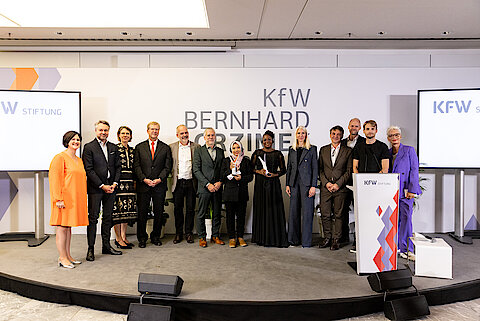
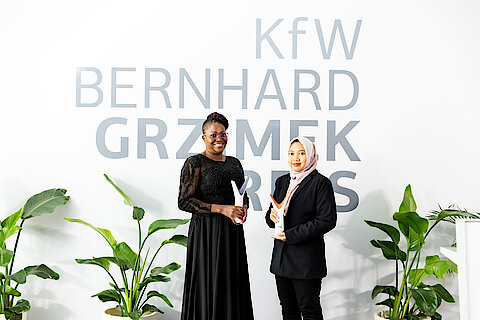
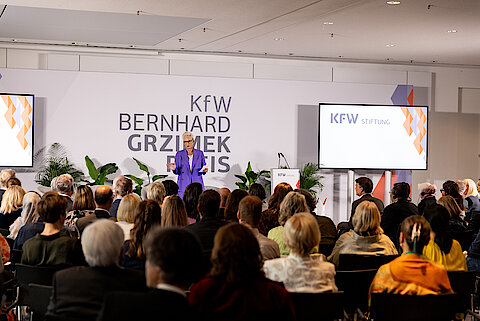
The Year 2022 in Review
The KfW Bernhard Grzimek Award in 2022 was granted to the next generation of conservationists.
"With their willingness to work for the protection of threatened habitats and thus preserve biodiversity, both award winners are making an outstanding contribution to the fight for the preservation of biodiversity and the protection of species diversity”, stated the expert jury in explanation of its decision.
In their work, both conservationists actively focus on local people and their conservation efforts: Rohit Singh on the role of professionally committed rangers worldwide and Txai Suruí on the involvement of indigenous communities in her Brazilian home region of Rondonia in the Amazon. Without the efforts and daily commitment of the local and indigenous populations, the great challenges in the protection of climate and biodiversity could not be met. Did you know, for example, that 36 percent of the world's rangers come from within 20 kilometres of the nature park where they work?
Rohit Singh is committed to recognising the achievements of rangers, networking them worldwide and improving their working conditions. To achieve these goals, he was instrumental in founding the Universal Ranger Support Alliance (URSA). His concern is to make visible the diversity of the tasks of the ranger profession and the importance that rangers have worldwide for the conservation of threatened ecosystems. At the award ceremony yesterday, Rohit emphasised that with visibility and knowledge comes the necessary appreciation that can lead to better working conditions and, in the long run, more effective nature conservation.
Walelasoetxeige Paiter Bandeira Suruí (Txai Suruí), a member of the Painter Suruí indigenous people, also places the efforts of the local people, the indigenous peoples in the Brazilian Amazon region, at the centre of nature conservation. They are the ones who, under life-threatening circumstances, work day after day to preserve the largest and most species-rich tropical forest in the world. To encourage recognition and support for this commitment, Txai now speaks worldwide. Only yesterday she spoke at the 77th United Nations General Assembly in New York, which is why Roberto Maldonado accepted the award on her behalf.
A jury consisting of Christian Grzimek, Prof. Dr Axel Janke/Biodiversity and Climate Research Centre (BiKF) of the Senckenberg Society for Nature Research and the Goethe University Frankfurt, Karen Möhring/KfW, Dr Christof Schenck/Zoological Society Frankfurt and Jens Schröder/Editor-in-Chief of GEO will decide on the winners.
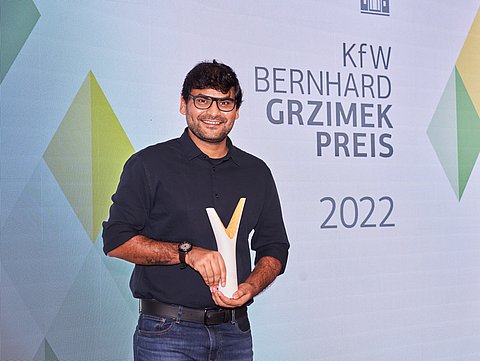
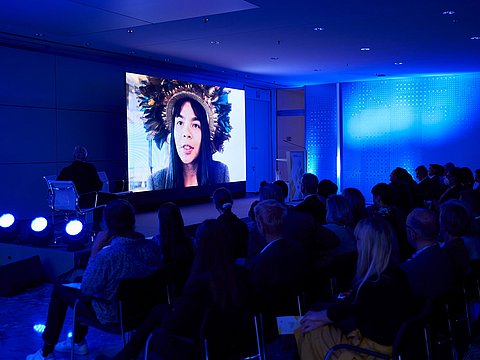
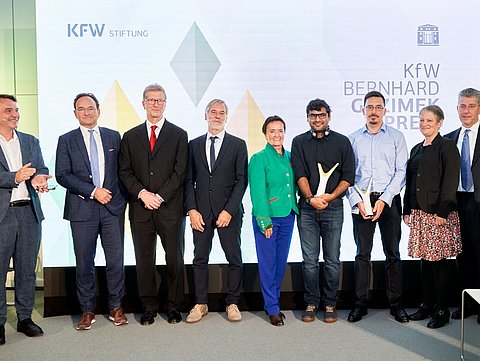
The Year 2019 in Review
Mama Ranger was honoured with KfW-Bernhard-Grzimek-Award and EUR 50,000 in prize money
The Philippine environmentalist Angelique Songco received the award for her outstanding commitment and groundbreaking management of the Tubbataha Reefs Natural Park
With more than 360 coral species, 600 fish species, eight marine mammals and around100 seabird species, as well as many different algae and seaweeds, Tubbataha Reef is one of the most bio-diverse places on earth. Mainly thanks to the dedication of the award winner, this extraordinary natural treasure did not suffer the same fate as many other overfished and dying coral reefs, but has been preserved to the present day. Although the Philippine government declared the region a nature reserve in 1988 and in 1993 it was designated a UNESCO World Heritage Site, illegal fishing and tourism continued to jeopardise this sensitive ecosystem. Songco, who has been managing the park since 2001, has developed an innovative and powerful strategy: It focuses especially on thorough educational work and on reaching out to convince people in person. In consequence, she has succeeded in raising awareness of environmental issues among the local community and, as a result, people have been taking greater care in using the Marine Protected Area. Above all, her work aims to develop an understanding among locals that increased conservation efforts are essential to securing their livelihoods and to improving living conditions in the area permanently. Carefully regulated tourism and sustainable fishing have taken on major importance as a reliable source of income for the region and the park.
Angelique Songco explained:“It is important to me to explain to people that oceans are not infinite, that they cannot absorb all our rubbish, and that if we continue in this way, there will soon be no fish left for us to catch. For it is only when people start to understand our seas that they begin to treat them with care.”
The 58-year-old’s considerate and caring interaction with people has earned her the affectionate nickname “Mama Ranger” from her team and the local population. Dr Lutz-Christian Funke from the Board of KfW Stiftungpointed out:“Both a heightened awareness and the willingness to take responsibility are crucial to climate and environmental protection. For this reason, the KfW-Bernhard-Grzimek-Preis honours charismatic leaders, who tackle ecological problems while also meeting economic needs. They thus create a win-win situation, set an example and inspire others to join in.
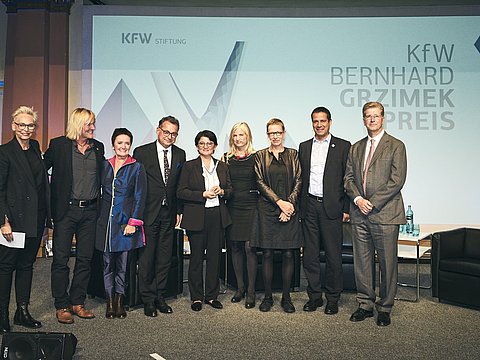
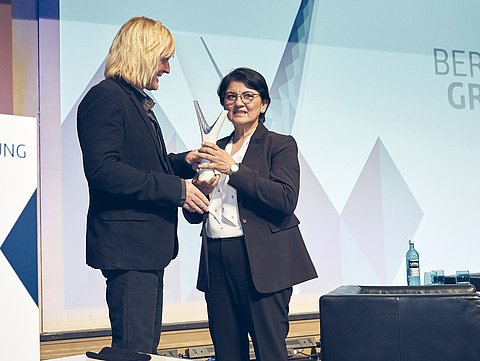
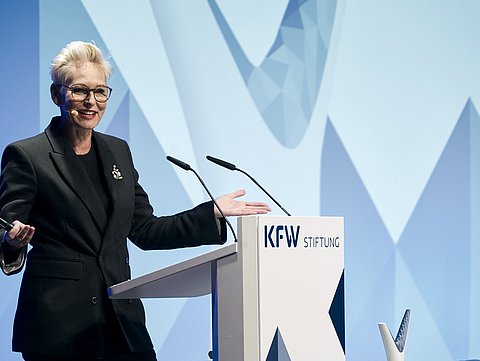
The year 2017 in Review
KfW-Bernhard-Grzimek-Award 2017 awards Andrew Zaloumis, CEO of iSimangaliso Wetland Park
KfW Stiftung presents the biodiversity award KfW-Bernhard-Grzimek-Award and EUR 50,000 in prize money for the third time. This year's award winner is the CEO of iSimangaliso Wetland Park, Andrew Zaloumis, whose ground-breaking work in one of South Africa's poorest regions sets an example for the future by uniting animal welfare and nature conservation with regional development.
In order to raise awareness for environment protection and species conservation particularly among the young audience, KfW Stiftung invites students from six technical (MINT) secondary schools in Frankfurt to meet the winner in the afternoon of the award ceremony. Teenagers interested in learning more about the connections between the Western lifestyle, its impact on the global environment and local nature conservation discuss these issues with Andrew Zaloumis and scientists from Goethe University Frankfurt. Special attention is given to the problem of plastic waste and its harmful effects on the world's oceans.
The following panel discussion, addressing this topic as well, will open the evening's festive ceremony: Under the title "The invisible crisis – our plastic waste in the world's seas", the winner Andrew Zaloumis, engages in a debate about our global responsibility and the regional consequences with Lucienne Damm, environmental manager at the cruise company TUI Cruises, Frank Schweikert, founder of the German Ocean Foundation and board member of the Federal Association for ocean waste, and Jo Ruxton, producer of the documentary film "A Plastic Ocean".
Afterwards, the award is presented to Mr Zaloumis in a festive ceremony. The laudatory speech is given by Dr Fanny Douvere, coordinator of the UNESCO Marine Programme in Paris.
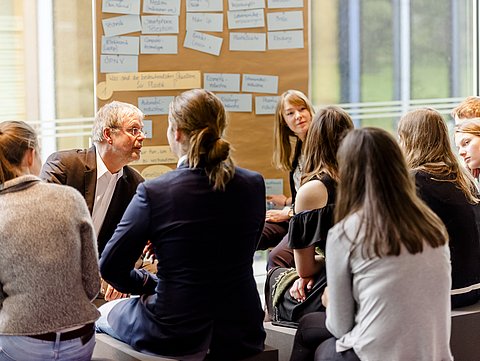
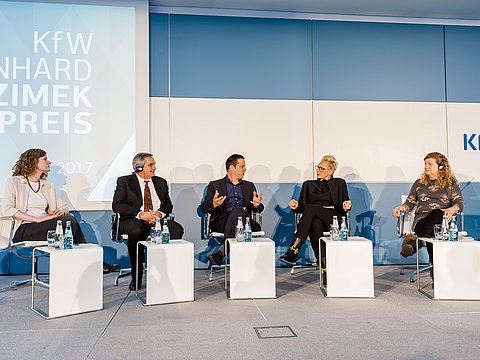
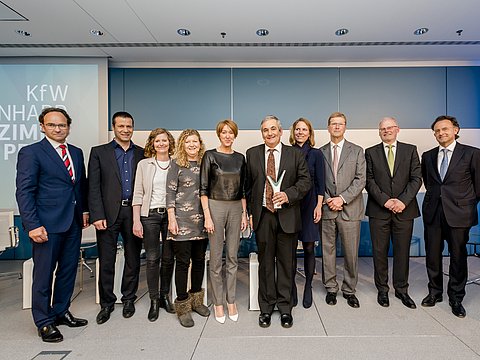
The Year 2015 in Review
The 2015 winners of the environmental award KfW-Bernhard-Grzimek-Award are Emmanuel de Merode and Pavan Sukhdev
The foundation KfW Stiftung has split the environmental award KfW-Bernhard-Grzimek-Award 2015 and the prize money of 50,000 euros, awarding one half to Emmanuel de Merode, director of Virunga National Park, a UNESCO World Heritage Site, and the other half to the scientist and economist Pavan Sukhdev.
Emmanuel de Merode has been honoured with the award for his outstanding work in Africa’s oldest national park and his commitment to protecting endangered mountain gorillas and the region’s unique biodiversity. In addition, he has launched essential economic initiatives in the national park, aiming to secure a sustainable livelihood for the population. He has contributed immensely to reducing poaching and illegal logging and has been crucial to the conclusion of peace agreements with rebel leaders in the border region.
Pavan Sukhdev has received the award for his leading contribution to the study “The Economics of Ecosystems and Biodiversity“ (TEEB). It offers a ground-breaking approach to evaluate biodiversity and for the first time ever allows the increasing costs resulting from the loss of biodiversity to be determined. Meanwhile, the approach has been adjusted to be used in different sectors and has been transformed into a useful tool for policy makers. In his tribute, Dr. Christof Schenck, director of Frankfurt Zoological Society, emphasised that both laureates had in their different ways not only proved their long-standing commitment to preserving biodiversity but had made a sustainable contribution to positive structural change.
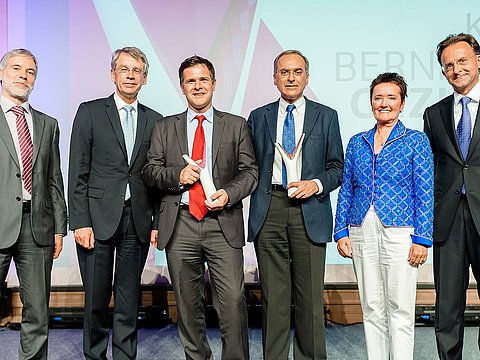
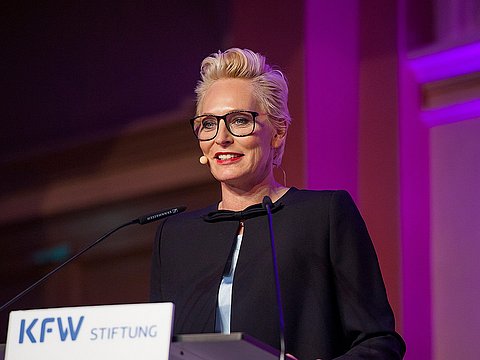
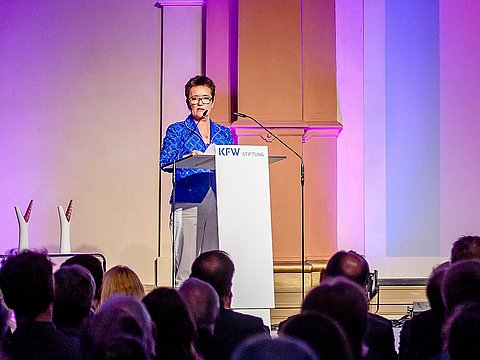
The Year 2013 in Review
The first environmental award KfW-Bernhard-Grzimek-Award goes to the Frankfurt Zoological Society (FZS), which receives the 2013 prize as an honorary award. KfW Stiftung thus honours the Frankfurt Zoological Society for its longstanding worldwide commitment to the preservation of biodiversity.
The Frankfurt Zoological Society will devote the prize money of 50,000 euros to its continuous cooperation with TANAPA, the authority for Tansanian National Parks. A new coordination centre will support the rangers of the national parks in their fight against ever more advanced methods of poaching. Every year on the African continent alone, 30,000 elephants and 700 rhinos fall prey to poachers. If poaching continues at this rate, these striking animals could be extinct ten years from now.
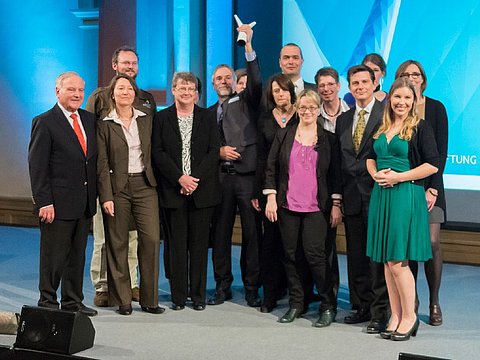
Programme Management
Pia Puljanic
Photo credits:
01. Image: Source: KfW Stiftung, Author / Photographer: Stefan Daub
02. Image: Source: KfW Stiftung, Author / Photographer: Stefan Daub
03. Image: Source: KfW Stiftung, Author / Photographer: Stefan Daub
04. Image: Source: KfW Stiftung, Author / Photographer: Stefan Daub
05. Image: Source: KfW Stiftung, Author / Photographer: Stefan Daub
06. Image: Source: KfW Stiftung, Author / Photographer: Stefan Daub
07. Image: Source: KfW Stiftung, Author / Photographer: Frank Blümler
08. Image: Source: KfW Stiftung, Author / Photographer: Frank Blümler
09. Image: Source: KfW Stiftung, Author / Photographer: Frank Blümler
10. Image: Source: KfW Stiftung, Author / Photographer: Frank Blümler
11. Image: Source: KfW Stiftung, Author / Photographer: Frank Blümler
12. Image: Source: KfW Stiftung, Author / Photographer: Frank Blümler
13. Image: Source: KfW Stiftung, Author / Photographer: Stefan Daub
14. Image: Source: KfW Stiftung, Author / Photographer: Stefan Daub
15. Image: Source: KfW Stiftung, Author / Photographer: Stefan Daub
16. Image: Award 2022, Source: KfW Stiftung, Author / Photographer: Stefan Daub
17. Image: Source: KfW Stiftung, Author / Photographer: Salar Baygan
18. Image: Source: KfW Stiftung, Author / Photographer: Salar Baygan
19. Image: Source: KfW Stiftung, Author / Photographer: Salar Baygan